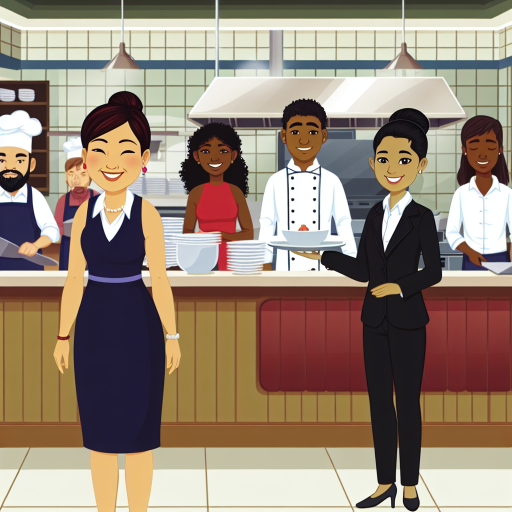Introduction
Effective conflict resolution is essential for restaurant managers to maintain a harmonious work environment.
Issues between staff members or customers can quickly escalate and impact the overall operation of the restaurant.
By addressing conflicts promptly and efficiently, managers can prevent disruptions to service, improve employee morale, and enhance customer satisfaction.
This blog post will provide practical tips and strategies for restaurant managers to effectively resolve conflicts and create a positive work culture.
Let’s dive in!
Understand Common Sources of Conflict in Restaurants
Identifying typical sources of conflict in restaurant settings is crucial for effective conflict resolution.
Some common sources of conflict include:
- Kitchen Delays: One of the most common sources of conflict in restaurants is kitchen delays. This can lead to frustrated customers and disgruntled staff members.
- Customer Complaints: Dealing with customer complaints can be stressful for restaurant managers. Resolving these issues promptly is essential to maintain a positive reputation.
- Employee Scheduling Issues: Employee scheduling conflicts can arise due to misunderstandings or lack of communication. This can result in understaffing or overstaffing, leading to further problems.
Importance of Recognizing These Sources
Recognizing these sources of conflict is crucial for restaurant managers to proactively address and prevent conflicts from escalating.
By understanding the root causes of conflicts, managers can implement strategies to mitigate these issues before they negatively impact the business.
Here are some reasons why it is important to recognize and address common sources of conflict in restaurant settings:
- Improved Customer Satisfaction: By addressing kitchen delays and customer complaints promptly, restaurants can improve customer satisfaction and loyalty.
- Employee Morale: Resolving employee scheduling conflicts and issues can boost employee morale and create a more positive work environment.
- Efficient Operations: By recognizing and addressing common sources of conflict, restaurants can streamline their operations and improve overall efficiency.
- Prevention of Further Issues: Proactively addressing conflicts can prevent them from escalating and causing further problems in the future.
Understanding and recognizing common sources of conflict in restaurants is essential for effective conflict resolution and the successful operation of a restaurant.
By addressing these issues promptly and implementing strategies to prevent conflicts from escalating, restaurant managers can create a positive work environment and enhance customer satisfaction.
3. Develop Strong Communication Skills
Effective conflict resolution in a restaurant setting heavily relies on clear and efficient communication.
As a manager, mastering communication skills can make a significant impact on how conflicts are managed and resolved.
Importance of Clear and Effective Communication
- Clear communication helps in clarifying expectations and roles, reducing misunderstandings that can lead to conflicts.
- It creates a transparent working environment where issues can be addressed openly and resolved promptly.
- Effective communication fosters trust and mutual respect among team members, essential for resolving conflicts peacefully.
- It enhances teamwork and collaboration, as employees feel heard and valued, contributing to a positive work culture.
Tips for Active Listening, Empathy, and Constructive Feedback
- Practice active listening by giving your full attention to the person speaking without interruptions or distractions.
- Show empathy by putting yourself in the other person’s shoes, understanding their perspective, and emotions.
- Use constructive feedback to address conflicts positively, focusing on specific behaviors or actions rather than personal attacks.
- Encourage open dialogue and create a safe space for employees to express their concerns and opinions without fear of judgment.
By honing these communication skills, restaurant managers can effectively navigate conflicts, promote a harmonious work environment, and enhance overall team performance.
Find Out More: Top Challenges Faced by Restaurant Managers
4. Implement Conflict Resolution Strategies
When conflicts arise in a restaurant setting, it is crucial for managers to have effective strategies in place to resolve them efficiently.
Here are some key conflict resolution strategies that can be implemented:
1. Compromise
Compromise involves both parties in the conflict making concessions in order to reach a mutually agreeable solution.
This can be effective when both sides are willing to give a little to find a middle ground.
Transform Your Career Today
Unlock a personalized career strategy that drives real results. Get tailored advice and a roadmap designed just for you.
Start Now2. Collaboration
Collaboration is a strategy where all parties work together to come up with a solution that satisfies everyone involved.
This can be beneficial when the conflict is complex and requires input from multiple perspectives.
3. Problem-Solving
Problem-solving involves identifying the root cause of the conflict and finding a solution that addresses the underlying issues.
This approach is helpful in preventing similar conflicts from arising in the future.
Choosing the Most Appropriate Strategy
When determining which conflict resolution strategy to use, it is important to consider the nature of the conflict and the parties involved.
Here are some tips for choosing the most appropriate strategy:
1. Assess the Situation
Before implementing a strategy, it is essential to assess the nature of the conflict.
Is it a simple disagreement or a more complex issue that requires a collaborative approach?
2. Consider the Parties Involved
Take into account the individuals or groups involved in the conflict.
Some people may be more open to compromise, while others may require a more structured problem-solving approach.
3. Communication is Key
Effective communication is essential in conflict resolution.
Ensure all parties involved are able to express their perspectives and actively listen to one another before determining the best strategy to use.
By implementing these conflict resolution strategies and choosing the most appropriate one based on the nature of the conflict and the parties involved, restaurant managers can effectively address conflicts in a timely and professional manner.
Ultimately, fostering a positive work environment.
Explore Further: How to Become a Restaurant Manager: A Guide
When it comes to effective conflict resolution for restaurant managers, one crucial aspect is training staff on conflict resolution techniques.
Here are some key points to consider:
1. Empower employees with conflict resolution skills
It is essential to empower your staff with the necessary skills to handle minor conflicts independently.
By providing them with the tools and techniques to address issues as they arise, you can prevent conflicts from escalating.
Showcase Your Business Today
Reach thousands of readers actively exploring professional services. Publish your business profile and grow your audience now.
Publish NowThis ensures a smoother operation overall.
2. Importance of role-playing exercises
Role-playing exercises can be incredibly beneficial in preparing your team for real-life conflict situations.
By simulating different scenarios and allowing your staff to practice their conflict resolution skills, you are equipping them with confidence.
They will tackle challenging situations effectively.
3. Regular training sessions
Consistent and ongoing training sessions are essential for maintaining and enhancing the team’s ability to resolve conflicts effectively.
By keeping your staff updated on the latest techniques and strategies, you ensure they are well-equipped to handle any conflicts.
Investing time and resources in training your staff on conflict resolution techniques is crucial for maintaining a positive work environment.
With the right skills and knowledge, your team will be better prepared to handle conflicts and ensure smooth operations within the restaurant.
Gain More Insights: Key Skills for Successful Restaurant Managers

Create a Positive Work Environment
Fostering a culture of respect, open communication, and teamwork minimizes conflicts.
Implementing strategies to boost employee morale reduces stress levels in the workplace.
In a restaurant setting, creating a positive work environment is crucial for effective conflict resolution and overall success.
By fostering a culture of respect, open communication, and teamwork, managers can minimize conflicts.
This approach creates a harmonious work environment for their teams.
Respect is essential in any workplace, especially in a fast-paced environment like a restaurant.
By setting the tone for respectful behavior, managers promote a culture of mutual respect among team members.
This culture helps prevent conflicts from escalating and makes it easier to resolve them.
Open communication is another key element of a positive work environment.
When team members feel comfortable sharing their thoughts, it prevents misunderstandings.
Regular team meetings and feedback channels help facilitate open communication.
Teamwork is crucial in a restaurant setting where cooperation is essential for success.
By fostering teamwork, managers create a supportive environment where employees help each other.
This cooperation prevents conflicts and eases conflict resolution.
In addition to respect and communication, managers should boost employee morale and reduce stress.
Happy employees are more productive and engaged, which helps prevent conflicts.
Recognizing and rewarding employees for hard work is one way to boost morale.
Showing appreciation through praise and incentives motivates employees to perform at their best.
Providing opportunities for development also boosts morale.
Training programs and mentorship help employees advance their careers.
Feeling valued reduces the likelihood of conflict among coworkers.
Reducing workplace stress is crucial for a positive environment.
High stress leads to tension, frustration, and burnout, contributing to conflicts.
Managers can reduce stress by promoting work-life balance and providing resources.
By creating a positive work environment, managers effectively reduce conflicts.
This strategy ensures employees can thrive and contributes to the restaurant’s continued success.
Discover More: Day in the Life of a Restaurant Manager
Address Conflicts in a Timely Manner
Addressing conflicts promptly is crucial to prevent them from escalating.
It helps to avoid further damage to the work environment.
Here are some tips on how restaurant managers can effectively manage conflicts:
-
Recognize the Importance of Prompt Resolution
Showcase Your Business Today
Reach thousands of readers actively exploring professional services. Publish your business profile and grow your audience now.
Publish NowAcknowledging the significance of addressing conflicts in a timely manner can help managers avoid allowing issues to fester.
-
Establish a Structured Approach
Create a structured approach to conflict resolution by setting up clear channels.
-
Encourage Open Communication
Develop a culture where employees feel comfortable voicing their concerns.
-
Provide Training on Conflict Resolution
Train employees on effective conflict resolution techniques such as active listening.
-
Act Swiftly and Objectively
Managers should intervene promptly and remain neutral.
-
Document and Follow Up
It is essential to document all conflicts and resolutions.
-
Seek Feedback and Continuous Improvement
Encourage employees to provide feedback on the conflict resolution process.
Conclusion
Effective conflict resolution is crucial for restaurant managers to maintain a harmonious work environment.
Key points include active listening, staying calm, and finding compromises to resolve conflicts efficiently.
Restaurant managers should prioritize conflict resolution to prevent escalation and promote teamwork among staff members.
By implementing these strategies, restaurant managers can create a positive work culture and enhance overall productivity.
Additional Resources
Conflict Resolution for Restaurant Teams
Conflict Resolution – Working in the Food Service Industry
[E-Books for Sale]
The Big Book of 500 High-Paying Jobs in America: Unlock Your Earning Potential
$19.99 • 500 High-Paying Jobs • 330 pages
Explore 500 high-paying jobs in America and learn how to boost your career, earn more, and achieve success!
See All 500 High-Paying Jobs of this E-Book
1001 Professions Without a Degree: High-Paying American Jobs You Can Start Now
$19.99 • 1001 Professions Without a Degree • 174 pages
Discover 1001 high-paying jobs without a degree! Unlock career tips, skills, and success strategies for just $19.99!




